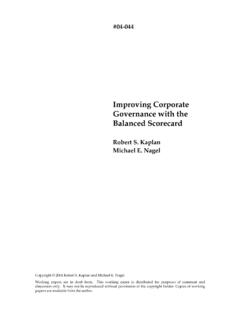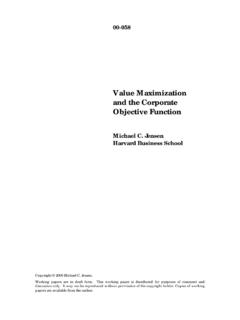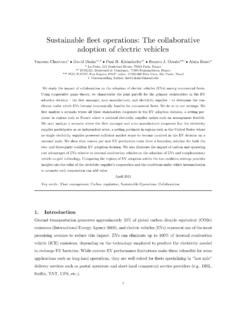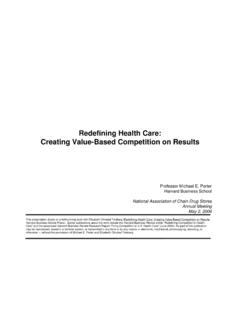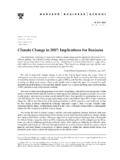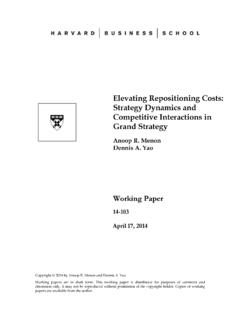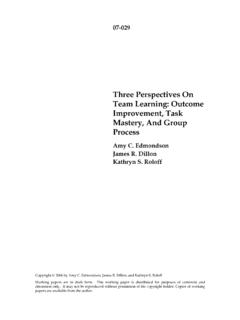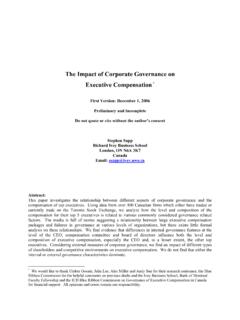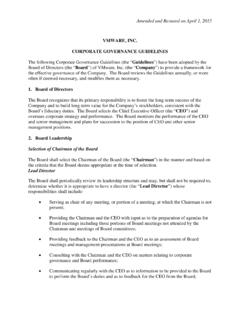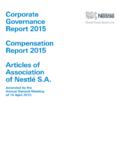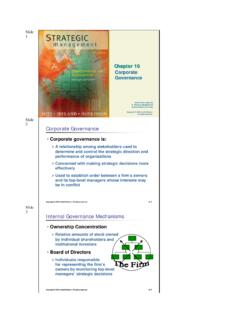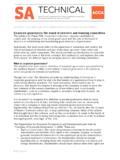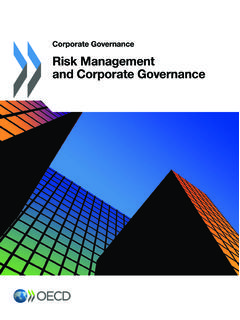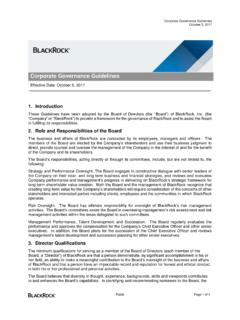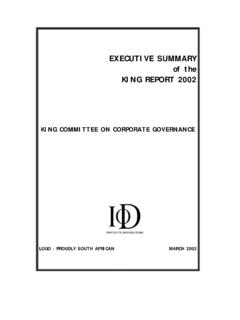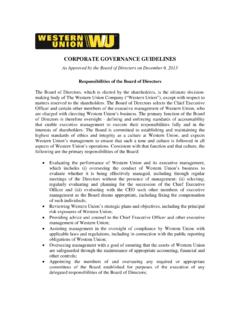Transcription of Corporate Governance and Executive …
1 Corporate Governance and Executive compensation for Corporate social responsibility Bryan Hong Zhichuan (Frank) Li Dylan Minor Working Paper 16-014 Working Paper 16-014 Copyright 2015 by Bryan Hong, Zhichuan (Frank) Li, and Dylan Minor Working papers are in draft form. This working paper is distributed for purposes of comment and discussion only. It may not be reproduced without permission of the copyright holder. Copies of working papers are available from the author. Corporate Governance and Executive compensation for Corporate social responsibility Bryan Hong Ivey Business School Zhichuan (Frank) Li Ivey Business School Dylan Minor Harvard Business School 0 Corporate Governance and Executive compensation for Corporate social responsibility Bryan Hong Ivey Business School University of Western Ontario Zhichuan (Frank)
2 Li Ivey Business School University of Western Ontario Dylan Minor Kellogg School of Management Northwestern University Forthcoming, Journal of Business Ethics 1 Corporate Governance and Executive compensation for Corporate social responsibility Abstract We link the Corporate Governance literature in financial economics to the agency cost perspective of Corporate social responsibility (CSR) to derive theoretical predictions about the relationship between Corporate Governance and the existence of Executive compensation incentives for CSR. We test our predictions using novel Executive compensation contract data, and find that firms with more shareholder-friendly Corporate Governance are more likely to provide compensation to executives linked to firm social performance outcomes.
3 Also, providing executives with direct incentives for CSR is an effective tool to increase firm social performance. The findings provide evidence identifying Corporate Governance as a determinant of managerial incentives for social performance, and suggest that CSR activities are more likely to be beneficial to shareholders, as opposed to an agency cost. Keywords: Corporate Governance , Corporate social responsibility , incentives for CSR, Executive compensation , non-financial performance measures, agency costs, board independence, institutional holdings, managerial power 2 1 Introduction Over the last several decades, Corporate social responsibility (CSR) activities have become an increasingly important investment by The growing significance of CSR as a phenomenon has raised a fundamental question: Does CSR enhance shareholder value, or is it an agency cost enjoyed by a firm s managers at the expense of stockholders?
4 While a substantial number of studies have examined this question from different perspectives, the evidence continues to be conflicting (Borghesi et al., 2014; Griffin and Mahon, 1997; Kruger, 2015; Margolis et al., 2009; Masulis and Reza, 2015). In this study, we investigate the agency cost perspective of CSR using a novel empirical test that exploits variation in Corporate Governance across firms to predict the existence of Executive compensation contracts linked directly to CSR activities. Our findings suggest that Corporate Governance is an important mechanism determining whether managers receive compensation linked to firm social performance outcomes, and that Executive compensation for CSR leads to more CSR activities.
5 To the best of our knowledge, our study provides the first quantitative empirical evidence identifying factors that lead to Executive compensation for CSR. In the debate among scholars about the effects of CSR on firm financial performance, one of the most prominent arguments against the financial benefits of CSR has been the agency cost prediction first made by Friedman (1970), who characterized CSR activities as self-interested behavior by individual managers at the expense of the firm s Subsequent studies have found supporting evidence of CSR as a potential agency cost, finding that CSR may be used to advance personal interests over the interests of shareholders (Borghesi et al.)
6 , 2014; Brown et al., 2006; Cheng et al., 2014; Jiraporn and Chintrakarn, 2013; Kruger, 2015; Masulis and Reza, 2015), provide added job security to inefficient managers by pleasing stakeholders (Cespa and Cestone, 2007), compensate for the negative consequences of engaging in earnings management (Prior et al., 2008), and enhance individual reputations of managers (Barnea and Rubin, 2010). However, a number of studies have also found a positive relationship between 1 For example, 63% of CEOs surveyed in the UN Global Compact-Accenture CEO Study on Sustainability (2013) expected sustainability to transform their industry within five years.
7 2 McWilliams et al. (2006) and Gao and Bansal (2013) provide overviews of the major theoretical perspectives regarding CSR and financial performance. In this study, however, we focus only on the agency cost argument. 3 CSR activities and firm financial performance (Orlitzky et al., 2003). Despite the considerable amount of academic attention, few definitive conclusions can be drawn from the collection of findings produced thus far. In addition to the conflicting academic evidence, anecdotal evidence from firms with strong public commitments to CSR can also provide ambiguous conclusions.
8 For example, consider the outdoor clothing company Patagonia, which donates 1% of its revenues to environmental organizations. In a case study by Casadesus-Masanell et al. (2009, ), a former senior manager at the company provides potentially conflicting views of the financial benefits of CSR, stating both that they seek to dispel the myth that in order to have a high quality product you have to have something damaging to the environment, and then later stating There is some tension between the environment and product reality is that they don't always go hand in hand.
9 These seemingly opposing statements raise more questions than provide answers in addressing whether CSR is truly beneficial for firm financial performance, or a net cost to the firm s shareholders. With respect to agency costs, a fundamental premise of the Corporate Governance literature within the field of financial economics is the notion that improved Corporate Governance ultimately leads to improved firm financial performance and value created for shareholders through the adoption of shareholder-friendly policies and the reduction of agency costs (Gompers, Ishii, and Metrick, 2003, 2010).
10 More shareholder-friendly (better) Corporate Governance is achieved through the implementation of rules, practices, and incentives to align the interests of a firm s managers with shareholders. As a consequence, shareholders benefit economically by advocating for improved Corporate Governance . In this paper, we link the Corporate Governance literature in financial economics and the agency cost perspective of CSR to derive theoretical predictions about the relationship between Corporate Governance and the existence of Executive compensation contracts that provide incentives for firm social performance.
